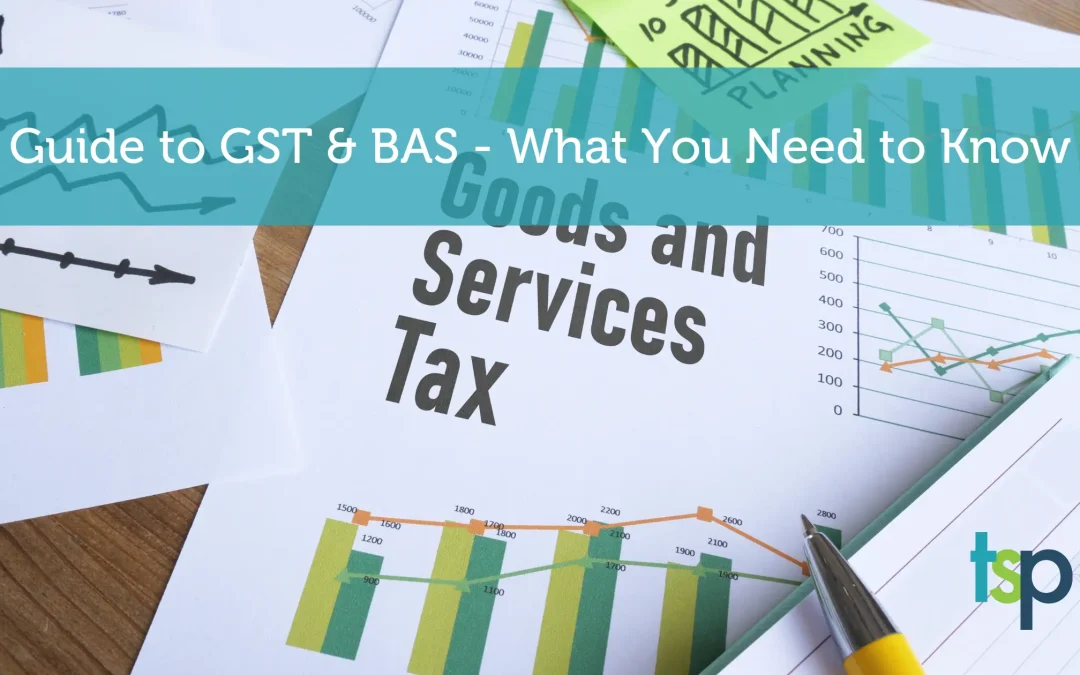A Beginner’s Guide to GST and BAS: What Every Small Business Owner Should Know
By Deidre Molloy, Director, TSP Accountants & Business Advisors. Connect with Deidre on Linkedin here
Navigating GST and BAS obligations can feel overwhelming for many Australian small business owners. Between calculating taxes, lodging reports, and meeting deadlines, it’s easy to feel lost in the process. But understanding the basics of GST [Goods and Services Tax] and BAS [Business Activity Statement] is essential for staying compliant and avoiding costly penalties.
As a small business owner, the complexities of GST and BAS can feel overwhelming. Over my years helping businesses, I’ve seen firsthand how understanding these fundamental aspects of business taxation can make a significant difference to your success and peace of mind.
What is GST and BAS? Understanding the Basics.
Let me start by demystifying GST. At its core, GST is a 10% tax applied to most goods and services sold in Australia. However, not every business needs to register for GST immediately. You’re required to register for GST when your annual turnover reaches or exceeds $75,000 ($150,000 for non-profit organizations). Even if you haven’t reached this threshold, you might choose to register voluntarily if it benefits your business model.
When you’re registered for GST, you’ll need to:
- Collect GST from your customers by adding 10% to your prices
- Pay GST on most business purchases (known as input tax credits)
- Report these transactions regularly through your BAS
- Hold onto your tax invoices and receipts for five years
Breaking Down BAS
Your Business Activity Statement (BAS) is your regular report to the ATO about your business tax obligations. Think of it as your business’s tax diary it’s where you record and report:
- GST collected and paid
- Pay As You Go (PAYG) withholding for employees
- PAYG installments for your own income tax
- Other tax obligations like wine equalisation tax or luxury car tax if applicable

Key Dates and Deadlines
The ATO requires businesses to report GST either quarterly, monthly, or annually, depending on your circumstances and is one of the most common questions I get from clients – BAS lodgment frequency. Your reporting period typically depends on your GST turnover:
* Quarterly reporting: Most common for small businesses (turnover less than $20 million)
* Monthly reporting: Required for businesses with turnover over $20 million
* Annual reporting: Available for voluntary registrants with turnover under $75,000
- Quarterly Reporting: Most common for small businesses [turnover less than $20million]
- Deadlines: 28th October, 28th February, 28th April, and 28th July.
- Monthly Reporting: Required for businesses with turnover over $20million
- Deadline: 21st of the following month.
- Annual Reporting: Available for voluntary registrants with turnover under $75,000
- Deadline: Usually tied to your income tax return.
Missed deadlines can result in penalties, so it’s crucial to mark these dates in your calendar.
Tips For Hassle Free BAS Lodgements
After years of helping businesses manage their BAS obligations, here are my top tips for making the process smoother:
1. Stay Organized Year-Round
Don’t wait until lodgment is due to get your paperwork in order. Implement a system to:
- Keep all tax invoices and receipts organized
- Regularly reconcile your accounts
- Track all business income and expenses systematically
2. Embrace Digital Tools
Modern accounting software can be a game-changer. It can:
- Automatically track GST on sales and purchases
- Generate BAS reports with a few clicks
- Store digital copies of receipts and invoices
- Connect directly with the ATO through Single Touch Payroll
Accounting software can make GST calculations and BAS reporting much easier.
3. Understand Common Mistakes to Avoid
I’ve seen businesses make these mistakes repeatedly:
- Claiming GST credits without valid tax invoices – ensure you have a record or tax invoices either physical copies of digitised copies for later reference
- Missing lodgment deadlines – ensure you have reminders set for each of the dates above
- Incorrectly calculating GST on deposits or layby sales
- Forgetting to account for private use of business assets – consider opening separate bank accounts
- Incorrect GST classification – understand what is and isn’t GST free [eg: healthcare, fresh food, education]
When to Seek Professional Help
While many business owners handle their own BAS lodgment, there are times when professional assistance is invaluable.
- When starting a new business
- If your business structure changes
- During periods of rapid growth
- If you’re unsure about specific GST treatments
- When dealing with complex transactions
The Benefits of Getting It Right
Taking the time to understand and properly manage your GST and BAS obligations offers several benefits:
- Better cash flow management
- Reduced stress during tax time
- Lower risk of ATO penalties
- Clearer understanding of your business’s financial health
- More informed business decisions
Tools to Simplify BAS and GST Reporting
Popular tools for Australian businesses:
- Xero: Automates GST tracking, BAS preparation, and lodgement.
- MYOB: Offers GST calculation features and integrates with ATO systems.
- QuickBooks: User-friendly for GST and payroll compliance.
These tools can save you hours of manual work and reduce the risk of errors. TSP are partners with all of these major software companies and are certified and accredited by these companies to integrate with our systems and those of our clients. We can monitor and assist you even remotely, without having to come personally to your business! Ask us how we can set this up for your business.
Looking Ahead
Remember, GST and BAS aren’t just compliance requirements they’re tools that can help you better understand and manage your business finances. At TSP Accountants, we’re committed to helping you not just comply with these obligations but use them to strengthen your business operations.
If you’re feeling overwhelmed or unsure about any aspect of GST or BAS, don’t hesitate to reach out. Our team at TSP Accountants specializes in making these complex matters simple and manageable for small business owners.
Let’s work together to ensure your business not only meets its tax obligations but thrives in the process.
Need help with your GST and BAS obligations? Contact TSP Accountants today for a consultation. We’re here to support your business success.

